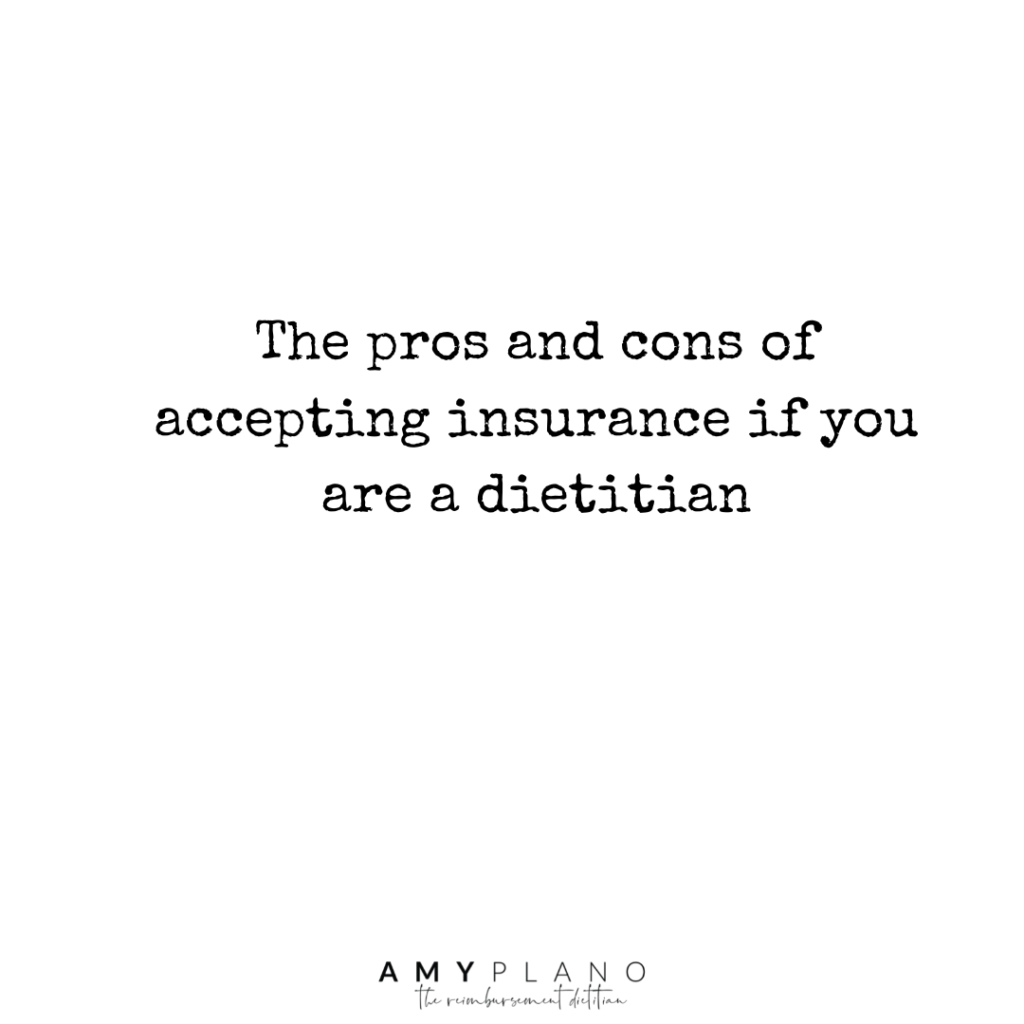I have no idea why I have not written a blog on the pros and cons of accepting insurance if you are a dietitian SOONER. But here it is. Obviously, as an insurance-based dietitian since 2007, I am a wee bit biased when it comes to insurance. However, as a hard-core realist, and a huge advocate for dietitians making smart business moves it is equally as important to talk about both sides of the coin as they relate to accepting insurance.
Ultimately, if you decide to accept insurance in your practice, I really want it to be a ‘Hell, yes,’ moment. If you are on the fence, then my suggestion is to read through the following words carefully and see where your heart lands.
Accepting insurance is no doubt a commitment. It is a commitment first and foremost to yourself. There is a learning curve and several steps you must take to create a successfully insurance-based practice. There will be many moments you want to give up. And yes, you will want to throw large objects across the room (while you scream REPRESENTATIVE!!! at the top of your lungs). But you won’t. Because at the end of the day you are a moutha-f*cking dietitian and have certainly been through harder shit.
Aside from it being an investment in yourself, accepting insurance serves as a commitment to the people you serve in your community. It identifies you as someone who strives for inclusivity in your practice. When you accept insurance for your services you are sending the message that awesome nutrition services delivered by an expert should not be a privilege but a right.
However, with that being said you owe to yourself, your clients, and our field to DO it RIGHT. Under no circumstances should you go blindly into accepting insurance and haphazardly bill.
It’s not cool to get credentialed, not know what the heck you are doing, bill inappropriately, and then blame insurance.
I get it! Trust me. This shit can be confusing. Not to mention overwhelming.
But nowadays, there are SO many resources on accepting insurance. Whether it be my epic reimbursement programs, other rad reimbursement coaches, The Academy’s payment resources, or the oodles of public Facebook pages you can join there are options for educating yourself before you start accepting and billing insurance.
And don’t get me wrong. I DO want YOU on #teamreimbursement. In fact, I have no shame in saying I want all private practice dietitians on my team. But I want us to do it right, with integrity, dignity, and confidence.
Accepting insurance has been a game-changer for my patients and my practice. And I know it can be for you and your practice.
So, without further ado, let’s tackle the top pros and cons of accepting insurance if you are a dietitian.
More people with your services
There is no denying the fact, when you are a Registered Dietitian in private practice who accepts insurance, you are able to help MORE people with your services. When you are only cash-pay, you can only help the people who can afford your services. This greatly limits the number of people you can help and ultimately impact with your services.
Therefore, if you are looking to increase your reach, magnify your impact and expand your practice’s growth potential you may want to consider accepting insurance in your practice.
ALL commercial plans are required to have preventative MNT benefits at no cost-share to your patients
Given the introduction of the Affordable Care Act in 2015, the important concept (which is NOT a new one – duh!) of preventative services emerged in the reimbursement space for dietitians. Whereas before this time period we only saw solid MNT coverage for marked disease states like diabetes, kidney disease, eating disorders, and some food allergies. It was also limited at best with some insurance carriers only covering a handful of MNT visits per year.
The ACA changed the reimbursement game for dietitians. Following its inception, all commercial insurance plans were required to offer some form of preventative MNT coverage for their patients who qualify. While the actual policies define the actual frequency of visits many plans cover unlimited visits as long as they are medically necessary.
And note: the majority of the time, YOU, the dietitian is the expert in determining medical necessity. All the power lies in your hands, girl. You earned it. Now use it.
The patient may not even require a formal diagnosis on many of these plans. When dietitians correctly follow the preventative guidelines for each insurance company their patients don’t have a cost-share (deductible, co-pay, co-insurance) for the visit. This means the patient can often see you as much as you deem necessary given their current health status and long-term medical goals.
PT want to use their benefits
This is an easy point to illustrate. We all have some form of health insurance. And whether you are self-employed, not employed, or employed and insured by a group-funded plan the majority of us are no strangers to high insurance premiums. In addition, deductibles and out-of-pocket costs for health care services appear to be at an all-time high. As a nation, this means we are paying more than ever for our health care needs. And while I am certainly grateful for modern medicine, I like everyone else want to be able to use these health insurance benefits we pay so much for. And it is not shocking our patients are no different.
Given the fact so many insurance plans cover MNT, coupled with the high cost we all pay to utilize these services, there is no denying the fact your patients want to squeeze as much is humanly possible from their health insurance benefits.
Therefore, if you are a cash-based dietitian it is likely not a surprise that many of your patients are asking the same EXACT question: Do you accept insurance?
As I mentioned, the ‘cost’ for many of your patients to see an RD is waived as long as you correctly code the visit as preventative. And even if you have to bill it as a medical visit the patient will generally just need to pay their cost-share towards your services.
Doctors love referring their patients to in-network RDs
I have no shame in saying the majority of my practice’s referrals come directly from local doctors within a 25-mile radius of my practice.
When you are an in-network insurance provider getting doctor referrals is easy-peasy! When you participate with insurance, the ‘hand-off’ from the doctor to the patient is often seamless. It can be as easy as the MD directing the potential client to your office phone, website, or online schedule to set up a discovery call or book their first visit.
Trust me when I tell you these doctors are looking for your services to direct their clients to, just as much as you are looking to land their referrals. The last thing they want to do is educate their patients on something they know little to nothing about. They want to stay in their zone of genius just like we do. So, think about creating this referral network as the ultimate definition of #winning.
In my reimbursement coaching programs, I not only teach you how to effectively market to physicians and health care providers. But I also teach you how to make the process literally seamless. When you have a step-by-step process to connect with the people who serve your clients getting a steady flux of ideal clients has never been easier.
Pay is solid
This is not my first rodeo when it comes to insurance. When I started accepting insurance the rates were double what I was making at my clinical job. Which truth be told, when I got my first insurance check I felt like a millionaire. And while I will NEVER forget those awesome feelings now, I can easily say, my insurance rates are leaps and bounds relative to what I used to make as a clinical RD. In many cases, the rates exceed 4-7 times the rate of most clinical jobs.
Your reimbursement rates as an RD will vary by state. As well as by insurance plan. So, what I receive in CT for certain plans, is different than a dietitian in a neighboring state like NY may receive. However, what I can conclude as a reimbursement coach who works with dietitians in pretty much every single state including both Alaska and Hawaii is the rates are solid. Yes, some rates are MUCH better than others! But as a whole, I would say most dietitians accepting insurance are making well above $100/hour and in some states DOUBLE that. I shit you not. Martha.
Curious about what the average rates are for your state?
Google Medicare + dietitian + MNT + rates. If you are an AND member these rates are located under the ‘payment’ tab on the Medicare section on their website. Medicare is a federal health insurance plan and these are the ONLY insurance rates that are public knowledge.
So, if you googling what Aetna’s MNT rates are or United MNT’s rates you are going to be looking for a long time. They are not public knowledge. Insurance reimbursement rates are proprietary to your contract and are never supposed to be shared.
Please note that the Medicare rates are noted in 15 minutes increments. So, if you are seeing a patient for an hour you need to multiply those values by 4. This will give you a sense of the middle-of-the-road rates some RDs are receiving for reimbursement.
Don’t need to ‘sell’ yo’self on social media
As I noted above it is very possible to do the majority of your ‘marketing’ by creating a strong referral network with local providers. In addition, when you become in-network the insurance companies will list your practice in their directory. So, when patients are searching for a dietitian near them, your smiling face will pop right up.
Also, the fact you accept insurance will often travel through your current clients rather quickly. In my practice, the relationship would often start off with one family member, and then the existing family member would refer other family members, friends, and coworkers (all of which had the same insurance benefits as them) to me as well. I was so grateful for the ‘easy’ referrals and knew while my skillset as a badass RD was awesome – it had more to do with the fact I accepted their insurance and the visits were covered.
Therefore, while you do need to put effort into marketing your practice as an insurance-based dietitian it’s very different from traditional marketing. When you are a cash-based RD, you need to hang out where your ideal clients hang out. Which for many RDs is on social media.
So many of us have love/hate relationships with social media. We like engaging in it as a medium for our personal life. But the thought of being on there non-stop because we ‘have’ to make a sale is rather daunting! And unfortunately, as we all know you can’t just show up once on social media. You need to show up consistently with a crystal-clear marketing message targeted at your ideal client. Because if you are talking to everyone, you are talking to no one!
While many insurance-based RDs choose to utilize social media as one of their elected marketing channels, it’s generally more because they want to and less because they have to. There are SO many more effective marketing strategies than relying on social media if you are an insurance-based RD. And most require far less effort as well.
So, if the thought of pimping yourself on social media 25-7 doesn’t appeal to you, then you might want to consider accepting insurance as your bulletproof marketing strategy.
You stand out
Not that your shit doesn’t already sparkle!
But as RDs we are constantly pointing the finger at non-credentialed people doing our jobs. Even if they do our jobs better than us (let’s be honest – some do!) For some reason, we just love to cast shade on people who don’t have R.D. after their names.
But guess what, yo?
Only credentialed professionals with legitimate degrees can accept insurance. Take that health coaches. Even if you are good. WE are better.
Want to stand out – start by accepting insurance. That automatically separates the sheep from the goats and the rockstars from the wannabes.
You can incorporate packages
Did you know if you accept insurance in your practice, you can still seemingly do it on most of your own terms?
You can …
…selectively choose which insurance companies you participate with …
… sell high ticket packages …
… deliver killer a la carte services that serve your ideal client.
It’s not insurance or the highway. People think they need to ‘ride or die’ with insurance only.
In fact, it is quite the opposite.
The sky is the limit when you accept insurance in your practice. It makes your patient’s life easier (as well as yours). But it doesn’t necessarily change the way in which you practice.
This is especially beneficial if you are a functional practitioner and offering a la carte services that insurance doesn’t cover in the first place (such as GI mapping, DUTCH testing, MRT testing, etc.) By accepting insurance, you can ‘lighten the financial load’ on your patients. Their insurance can potentially cover the MNT aspect of their treatment regime with you while helping defray the overall amount of money they need to lay out long term. This way everyone benefits from this scenario.
The pros and cons of accepting insurance if you are a dietitian would not be complete without talking about some of the drawbacks. As much as I want to position accepting insurance in your nutrition practice in a positive light, it is only fair to address some of the apparent downsides as well. So, let’s get to it!
Not all policies are universal
While there are certain insurance plans that behave similarly from an MNT coverage standpoint to other plans, a patient’s benefits are determined on a policy level NOT a plan level. For example, while the majority of Anthem Blue Cross Blue Shield plans in CT provide unlimited MNT visits as long as they are medically necessary, there may be a handful of policies that don’t cover any visits. While this is certainly the exception and not the rule in CT, it all comes down to a patient’s particular policy.
In my EPIC reimbursement coaching program, I teach dietitians exactly how to navigate these nuances. And while I do my best to provide specific step-by-step instructions I am not going to lie; this process can be frustrating. However, what I can sincerely tell you is the more you bill, the more comfortable you will become with each individual plan. Just like anything in life, you will start to see trends and become more confident with each claim you submit and get paid for. And what starts off daunting, will seem seamless the more you practice.
Not taught this in skool
I know we all feel this at our core. We are not taught anything about accepting insurance OR private practice in skool or during our internships. In fact, if I remember correctly, I was told to run as fast as possible away from starting an insurance-based practice.
Therefore, not only is our robust, million-dollar curriculum lacking in education surrounding these important, career-altering concepts it’s also missing any sort of advocacy for any alternative RD path.
More so, people in positions of authority who we look up to (who don’t know anything about accepting insurance or opening a private practice because they have been working in the basement of the same hospital, they did their internship 40 years ago!) discourage our dreams of becoming independent insurance-based RDs who not only make a massive impact with their services they also generate a killer salary.
And I know those words just formed the world’s biggest run-on sentence. But the shit that I just said was important. So, it is okay to violate proper grammar, yo!
This leaves us feeling frustrated and full of animosity towards the very institutions that made us who we are. But a smart person once told me, “Fuck that noise!” and blaze your own path. Spending time harping on what our educations didn’t teach us, gives far too much power to an antiquated system collecting dust.
Take control of your own career.
Find yourself a mentor or coach.
Follow other insurance-based dietitians on social media. Take them out for lunch (Not just coffee. These Queens deserve a proper meal). Listen carefully to their stories of growing their empires.
And get inspired by the thousands of other insurance-based dietitians who are out there kicking butt, taking names, and making an impact in their communities.
Not all networks are open
Insurance companies credential you based on the zip code you provide for your physical office address. Yes. You do NEED a physical address to credential with the insurance companies. And depending upon how many other dietitians are already ‘supposedly’ already participating as in-network providers with the insurance company in that zip code they may inform you that the network is closed to new providers.
I say supposedly because often when you review the directory there are often not ANY RDs within a 25 miles radius of your office zip. And if there are none of them work with the types of patients you do. In fact, more often than not, many of the RDs listed in the directory no longer practice at the address they are listed at (or practice at all!) Yet, they are still taking up a ‘spot’ in a limited provider base.
This happened to me twice in my career. Once with Aetna. And the other time with United Health Care. Just like I teach the dietitians enrolled in my coaching programs how to successfully appeal closed insurance panels, I did the same for my practice. It took me a hot second (and many letters) to get ‘in’. But I am grateful I put in the work as both insurance companies are awesome to work with in CT.
So, while it’s not uncommon for a network to be closed, don’t let that stop you from appealing. And if this is something you are struggling with, I literally hand you the actual appeal letters I used to get in. No reinventing the wheel when you work with me.
Poor communication
The level of insanity as it relates to the poor communication occurring before, during, and even after you have been credentialed/contracted with the insurance companies is maddening. Never have I worked in an area of my practice, where the level of communication is as poor as dealing with various insurance companies.
I am not going to sugarcoat it. It is horrible. And to be honest I don’t know how they get away with it.
My favorite is when you request your fee schedule (something you are entitled to!) and they tell you they can’t give you that information until AFTER your sign your contract. All of which is bananas. Or you get an automated email reply that says they will get back to you within 30 days.
Thanks. Super helpful.
If that’s not completely cracker-jacks then I am not sure what is.
My team and I experience this just like everybody else. However, often given our tenure in this world we tend to be plugged into back-end people who allow us sometimes to bypass these individuals who for lack of a better word ‘suck.’
Words of wisdom – roll up your sleeves, crank the hip-hop (Biggy, Biggy can’t you see sometimes these insurance companies hypnotize me!), tighten your ponytail and know you will get through it (eventually). And hopefully, if you are working with a coach, they can help expedite the process or steer you in the right direction.
Better coverage for certain conditions
I work in weight management. In addition, I work with many of the conditions that go hand-in-hand with weight management like pre-diabetes, diabetes, PCOS, hypertension, and high cholesterol. Due to the policies enforced by the ACA, billing insurance for my patients is a piece of cake.
Why you ask?
Because the majority of my patient’s insurance plans have to cover preventative services. And the conditions noted above are part of the criteria for services covered under the ACA. When patients are seen and properly billed for preventative services, they pay nothing for these services.
Does this mean that other diet-related conditions are not covered?
No. Believe it or not, we live in a time and place where the majority of diseases and disorders we as dietitians treat from a dietary standpoint are in fact covered. However, many of these conditions are covered on the medical side of a patient’s insurance policy.
Is that a bad thing?
No. It just means just like with any medical service the patient receives there is often a cost-share to utilize the services. This might come in the form of a deductible, co-pay, or co-insurance. A cost-share is simply put in place to discourage a patient from using a service they don’t necessarily need. It puts some of their skin in the game as they say!
In many states, there are even laws in place where certain conditions MUST be covered. Two of the most common ones are eating disorders and diabetes. While these conditions may not fall under the patient’s preventative side of the policy, they have covered services and you will be reimbursed your normal rate minus any applicable cost shares your patient has.
So, while the ‘easiest’ billing is in the preventative arena (and some plans have ZERO requirements to qualify!) don’t fret. TONS of other nutrition diagnoses are covered under our scope of practice as well on MANY policies.
SO I hope this blog helps if you are on the fence about accepting insurance in your nutrition private practice. I feel like I could talk for days about the pros and cons of accepting insurance if you are a dietitian. However, for so many of us, the decision is a no-brainer. We want to make killer money, help a boatload of people with our services, and live life on our own terms as business owners. Accepting insurance in your practice can give you that and then some.
Trust me. I got you, boo!





